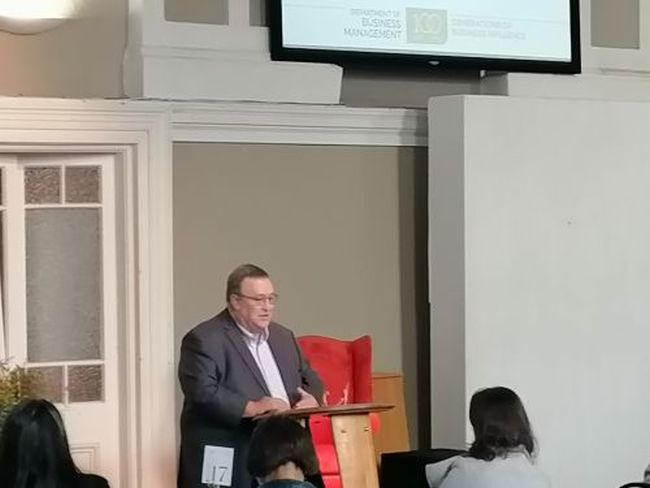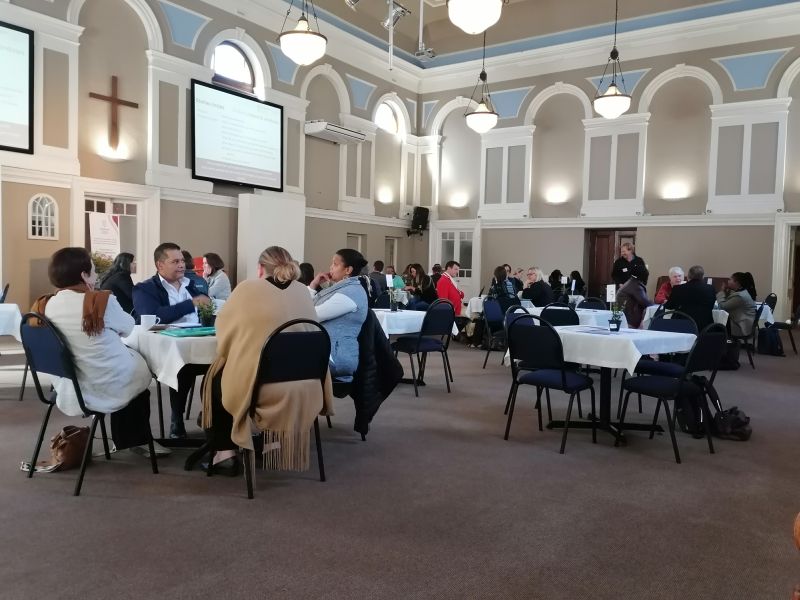The Department of Business Management, within the Faculty of Economic and Management Sciences, recently held a Non-profit Symposium to honour the enormous contribution of the industry to South African society. This is the first of a series of events planned by the Department as it celebrates 100 years of existence this year.
The symposium, held on 09 May 2024, attracted industry players from diverse backgrounds, and organisations such as Breadline Africa, Scouts SA, the Laureus Sport for Good Foundation and the SA Riding for the Disabled Association. Under the theme “Generations of Business Influence”, participants were encouraged to share their stories and learn from each other through the use of the UNESCO Story Circles concept. This storytelling methodology aims to foster empathy, understanding and appreciation for different cultures and identities.

In his welcoming address, Prof Gert Human, Chair of the Department of Business Management, said the non-profit industry plugs the gaps caused by capitalism.
“I think the world is increasingly realising that capitalism cannot cover everything. That is why we need NPOs (non-profit organisations). They play a critical role in the economy and the social life fabric of any country. Therefore, when I think about NPOs I think of them as islands of hope. And looking at it from a business management and business science perspective, if we can connect to this hope and this ecosystem then we probably have a better chance to collectively address the challenges that society faces today.”
Dr Debbie Human-Van Eck, senior lecturer in the department and co-organiser of the event, said it is quite special that they are starting their centenary celebrations with a non-profit symposium because it shows how the department has evolved over 100 years.
“Most people would say business management is all about money and making money. And yes, money can do amazing things not only to make businesses more successful but also to make society a better place. That is why we are acknowledging and celebrating the nonprofit sector here today. These are people who are doing what they are doing every day not because of money, but because it’s their passion and because they care.”
She added that the department’s social impact initiatives played an important role in them deciding to host the non-profit symposium.
“We embarked on a process in the department where we tried to find out more about what our people are doing in the social impact space. We discovered that there are quite a few colleagues who are on the boards of NPOs where they share their expertise. Others host projects where students collaborate with NPOs, consult in NPOs, invite NPOs to be guest speakers at our department, and are involved in research related to the non-profit industry. We decided to embrace this energy and see if there is a way to interact more and build better relationships with NPOs, hence this symposium.”

Mdebuka Mthwazi of Sikhula Sonke Early Childhood Development, a NPO that provides outreach and support programmes to communities in Khayelitsha, said he found the symposium educational and thought-provoking.
“The story circle discussions gave us a better understanding of who does what in the NPO sector and how we can support each other to contribute to society at large. I wish our politicians could have been a part of this initiative to hear our stories and to understand how they can support us and what needs to be done to bring about change in communities.”
He added that he would be connecting with fellow participants whom he met at the symposium to discuss how they can best share resources and practices.
Anthea Farmer of Masisports, an NPO that aims to help schools in Masiphumelele with sports development and community capacity building programmes, said what stood out for her is the passion that everyone has for what they do.
She said it was also highly informative to hear of the diverse funding opportunities that were discussed such as grant funding and CSI (Corporate Social Investment) funding and that NPOs should not just rely on government funding.
According to Human-Van Eck the Department also has other events lined up for the year. This includes an alumni speakers’ series, an academic conference, a workshop on financial literacy and a symbolic celebration in the week of 15 September when the department reaches the 100-year-old milestone.
Alongside Human-Van Eck, the event was organised by Dr Anika Berning Van Zyl, Hanli Mulholland, Theresa Visser and Annali Maas.

